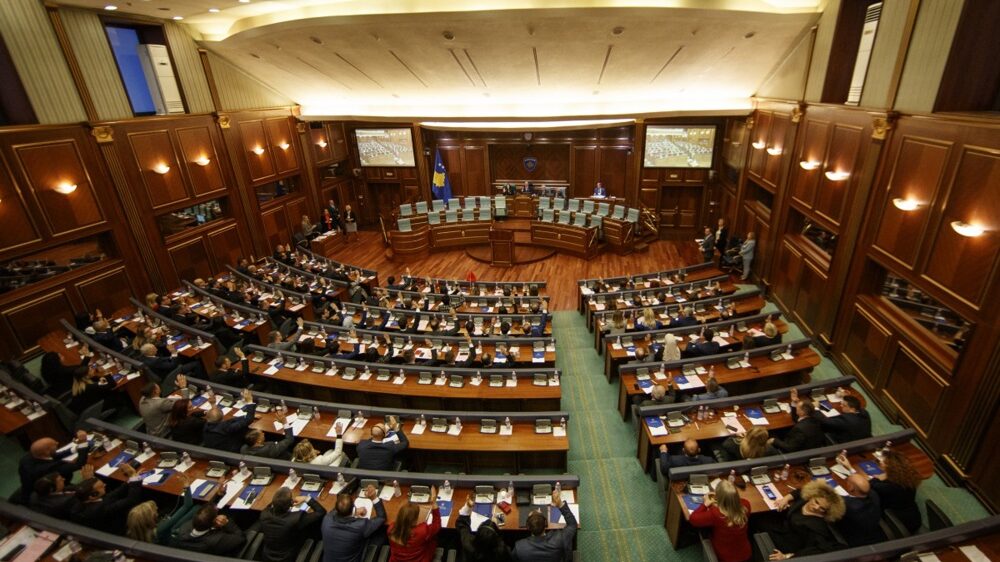For nearly 12 years, the establishment of the Association of Serb Majority Municipalities has been a hurdle between Kosovo and Serbia. By following Kosovo’s Constitution, this seemingly complicated issue is actually straightforward and resolvable.
Kosovo and Serbia have been locked in a frozen conflict since the former declared independence in 2008. While the two countries have struck limited agreements in the years since, the overall dispute remains as bitter as ever.
One of the largest points of contention between Kosovo and Serbia has been the establishment of an Association of Serb Majority Municipalities (ASMM). Serbia has long pressed for the creation of the ASMM, a body aimed at coordinating municipalities with a Serb majority within Kosovo. Likewise, towns and cities in Kosovo with a majority population of ethnic Serbs have long professed a desire to create an association among them. Kosovo promised that an ASMM would be formed when it signed the First Agreement of Principles Governing the Normalization of Relations (First Agreement) in 2013 that declared that “there will be an Association/Community of Serb majority municipalities (ASMM) in Kosovo.”
The agreement was reached more than a decade ago, and the ASMM was never created. Governments led by four different political parties have come and gone in Kosovo while the ASMM remains unestablished. Democratic and Republican Administrations in the U.S., as well as officials from the European Union, have been unable to shepherd the project to fruition.
Today, the absence of the ASMM is a major stumbling block in the Dialogue between Kosovo and Serbia, and a cause of significant frustration among U.S. and EU leaders.
The failure to establish the ASSM, despite its obvious consequences, raises four key questions:
- What process does the Kosovo Constitution (the Constitution) lay out for creating municipal associations?
- Has that process been followed?
- What obligations does Kosovo have regarding the establishment of the ASMM?
- Would adhering to Kosovo’s constitutional process provide a pathway to creating the ASMM and resolving this longstanding issue?
The Public International Law & Policy Group has recently prepared a report which attempts to answer these questions and outlines a possible pathway to break the current inertia in the establishment of Kosovo’s ASSM. In the report, we contend that if the Constitution, which the United States helped write, is followed, Serb majority municipalities can establish and join associations immediately without any additional actions by any other actor.
Regardless of the declarations and efforts of the international community and negotiations between Kosovo and Serbia, municipalities are fully empowered to adopt aspects of the constitution on their own. This article explains those constitutional powers and limitations and provides guidance on implementation.
Kosovo’s Constitutional Framework for Associations

Vehicles move in the streets decorated with Serbian flags in Northern Mitrovica, Kosovo, 06 November 2022. Photo: EPA-EFE/DJORDJE SAVIC
The Constitution contains several provisions regarding municipalities. Most importantly, it expressly codifies the sole right of communities and municipalities to create and join associations of municipalities. Kosovo’s central authorities cannot create associations under the Constitution via acts of the Assembly, the government, or agreements reached with other countries. This is important because it establishes that municipalities in Kosovo, including Serb majority municipalities, already have the power to create or join associations without any further action by Kosovo’s central authorities or another external actor.
The 2013 First Agreement, which is the only agreement between Kosovo and Serbia that has been formally ratified by Kosovo’s Assembly, confirmed that the creation of the ASMM would align with the process specified in the Constitution. It states that the ASMM will be “established on the same basis as the existing statute of the Association of Kosovo Municipalities.” This already existing Association of Kosovo Municipalities, which has no ethnic basis, was created consistent with the Constitution by the municipalities without any additional action by Kosovo’s central authorities. Thus, following the same constitutional process, the statute creating the ASMM would be laid out in an equivalent way – by the municipalities themselves.
Moreover, given that the right to create an association is reserved solely for municipalities by the Constitution, any requirement for Kosovo’s central authorities to act before municipalities can create their ASMM would likely violate the rights of municipalities under the Constitution. Likewise, mandating some form of international agreement before the municipalities can establish their association would infringe on the constitutional rights of the municipalities.
In other words, the Constitution states that the creation of associations should be left to municipal discretion. The Kosovo government, the U.S., the EU, and Serbia are not legally involved in the process. If the Serb municipalities want an ASMM, they can create it without external input.
Powers Afforded to Associations under Kosovo Constitution

Members of the Parliament of the Republic of Kosovo in Pristina, Kosovo. Photo: EPA/VALDRIN XHEMAJ
The ASMM cannot assume unlimited powers and must comply with the Constitution. Under the Constitution, an ASMM cannot assert any powers exceeding those which the municipalities already have.
Some actors in Kosovo have expressed concern that if the ASMM is granted too many powers, it could morph into something akin to Republika Srpska – the Bosnian republic that operates mostly outside of federal Bosnian control. Given the tension Republika Srpska has brought to Bosnia and the region, those concerns are understandable. However, the Kosovo Constitution does not permit granting the ASMM such an expansive role, and if the Constitution is enforced, the ASMM will not become another Republika Srpska.
But what if the Serb-majority municipalities try to create an ASSM with competencies which exceed the constitutional powers of a municipality? In that case, how will the ASMM be reined in and who will govern the ASMM?
The answer is Kosovo’s Constitutional Court. In 2015, the Court adjudicated challenges to the 2015 agreement between Serbia and Kosovo regarding establishment of the ASMM. In essence, the Court blocked the 2015 agreement, declaring it “not entirely constitutional,” because of its expansive vision of the ASMM. Under the 2015 agreement, the ASMM would be created by the Kosovo central authorities and would function in parallel to the Kosovo government. If a future ASMM attempts to assert powers beyond those of the municipalities themselves, the President of Kosovo has the power to refer the ASMM’s statute to the Constitutional Court to review its compatibility with the Constitution and prevent this from happening, if appropriate.
Why Has the Constitutional Path Been Ignored?

Serbia’s President Aleksandar Vucic (L), High Representative of the European Union for Foreign Affairs and Security Policy Josep Borrell (2-L) and Kosovo’s Prime Minister Albin Kurti (R) February 2023. Photo: EPA/STEPHANIE LECOCQ
Despite the Constitution offering a clear path forward, the U.S. and the EU have chosen to bypass this process. Political pressure from Serbia, as well as a desire for a negotiated settlement, likely influenced this decision. While this diplomatic approach was aimed at a lasting resolution, it overlooked the simplicity of the constitutionally-mandated approach.
Rather than embracing the Constitution and leaving the creation of the ASMM up to the municipalities, the U.S. and the EU are pressuring Serbia and Kosovo to agree on the powers of the ASMM. They have also pressed the Kosovo government to develop a statute for establishing the ASMM.
Unfortunately, this process has failed to manifest an ASMM over many years. It has only resulted in unending negotiations, anger between the parties, and recriminations against various actors while handing an easy rhetorical issue to Kosovo’s detractors.
To make matters worse, neither of the presented pathways are constitutional.
The municipalities already have the constitutional power to create their association without action or approval by the U.S., the EU, Serbia, or the Kosovo central government. In fact, from a constitutional standpoint, all of the negotiations and disputes between Kosovo and Serbia, and Kosovo and the U.S. and the EU over the ASMM ignore the existing pathway. Constitutionally, the municipalities can move forward today.
But there’s one problem: for a municipality to act, it requires duly elected officials to take those steps. Presently, the four Serb-majority municipalities in northern Kosovo are governed by democratically-elected, but unrepresentative ethnic-Albanian mayors and councils. Those officials took office after an election boycotted by the local Serb population in 2023. Elections have been scheduled in those four cities three times over the last several years, but the local Serb population boycotted the vote each time. As a result, there is no one in office with the interest or popular legitimacy to form the ASMM.
Path Forward

Kosovo Government building. Photo: Atdhe Mulla.
If the four northern cities want to establish the ASMM, they need to elect officials to make that decision. From the perspective of the U.S. and the EU, which have been concerned about northern Kosovo for years, the constitutional process elegantly accomplishes two of the West’s key goals: election of representative leaders in the four municipalities and the creation of the ASMM. Oddly, by doing nothing regarding the ASMM, the U.S. and EU may accomplish more in northern Kosovo than they have after years of diplomatic meetings, dialogues, and pressure.
There is a process to achieve the creation of the ASMM and to get out of the dead end in which we have placed ourselves. It is time to stop trying to force reluctant parties in Belgrade and Prishtina to engineer the ASMM’s creation. Instead, stepping aside and allowing it to happen in accordance with the Constitution – drafted with the support of the U.S might indeed be the best path forward.
* Jason Steinbaum is Adjunct Professor of Government at American University, Affiliated Expert at the Public International Law & Policy Group, and former Staff Director of the U.S. House Foreign Affairs Committee under Chairman Eliot L. Engel.
* Dr. Paul Williams is Professor of Law and International Relations at American University and Co-Founder of the Public International Law & Policy Group.
* Sindija Bēta is Legal Officer at the Public International Law & Policy Group.
The opinions expressed are those of the authors only and do not necessarily reflect the views of BIRN.





